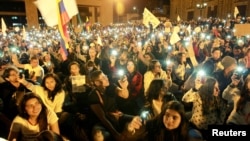Armed groups have forced thousands of Colombians from their homes in the Pacific jungle this year despite a peace accord ending half a century of civil war, the U.N. refugee agency (UNHCR) said Friday.
The Colombian government signed a peace deal in December with the left-wing rebel group, the Revolutionary Armed Forces of Colombia (FARC) to end a war that has killed around 200,000 people.
But other powerful armed groups, many involved in drugs trafficking, illegal mining of gold and silver, and extortion rackets, continue to uproot people, including women and children, with dozens of families fleeing together in fear of their lives.
So far this year nearly 3,600 people have been displaced from Colombia’s Pacific western jungle region alone, and last year more than 11,000 people were forced to flee their homes to escape violence in the area, the UNHCR said.
“We are deeply concerned at the increasing levels of internal displacement,” William Spindler, UNHCR spokesman, told a news briefing in Geneva Friday.
“Since the signing of the peace agreement, increased violence by new armed groups has resulted in killings, forced recruitment, including of children, gender-based violence ... as well as movement restrictions and forced displacement of the civilian population,” Spindler said in remarks published online.
Colombia’s resource-rich Pacific coast, a poor and underdeveloped rainforest area, has long been a hotspot of violence as armed groups fight for territorial control.
Much of the violence is attributed to criminal gangs, many linked to former right-wing paramilitary groups, who officially demobilized more than a decade ago but have continued to participate in violence and drug trafficking.
“Afro-Colombian communities and indigenous people have been particularly affected by the violence, which is endangering their survival,” Spindler said.
According to government figures, Colombia’s 52-year-old conflict has uprooted 7 million Colombians, one of the highest displaced populations in the world.





